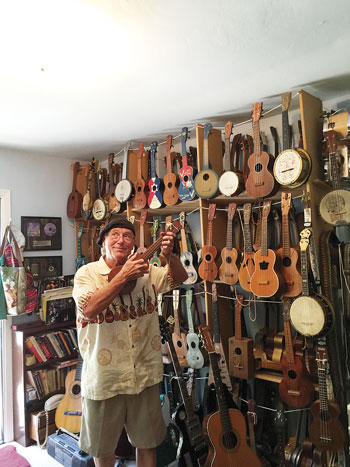 Conversations at gatherings are as individual as the thumbprints of the guests involved. We are enriched by hearing another’s point of view and inspired by their engagement in the world. Once past the weather and social discourse, unexpected topics begin to expand our horizons.
Conversations at gatherings are as individual as the thumbprints of the guests involved. We are enriched by hearing another’s point of view and inspired by their engagement in the world. Once past the weather and social discourse, unexpected topics begin to expand our horizons.
Such was the atmosphere when a brief conversation with Rick McKee brought a perspective of a book I’ve been enjoying called The Brain That Changes Itself by Dr. Norman Doidge, a leader in the neuro-plasticity revolution.
You may know Rick by his great contributions to stage in our area as the delightful performing musician and personality, Ukulele Dick. He’s achieved expertise as, a singer/songwriter, actor/producer, sound designer, instrument repairman, luthier (maker of stringed instruments) master, musical archivist and music memorabilia collector. Naturally growing to be a mentor to many in these arenas as well as life in general.
Like a seasoned performer he keyed into one of my roles in the community — providing TLC (Tender Loving Care) for VIPs of all ages — which led the conversation to memory and music. Yes, music is a big part of providing care, as well as other offerings of nostalgia. Then I recalled an exhibit “The Santa Cruz Music Archives” held at The Attic Gallery in 2005. It featured posters, recordings and everything promoting local artists Rick had collected. That’s when Ukulele Dick tells me he’s felt challenged, even as a child, with short term memory loss.
Am I really hearing this master musician who performs without sheet music say “short term recall trips him up?” He confirms this and agrees to continue the conversation at his studio in the shadow of the redwoods.
Previewing his website my mind feels like it’s wandering in the smog that gathered in San Gabriel Valley in the ‘70s. That’s when Rick traveled to Santa Cruz to breath fresh air and search for his place in the world. Still curious, I trusted we’d lift the veil of this mysterious recall contrast in the mind of our local musical master.
Rick believes that as a musician it is his job to know the music by memory and as a performer, it is his gift and privilege to connect to the audience. He chooses to have no paper or notes in the path to obstruct the gift of the melody and the lyrics.
He spends significant time learning chosen songs until they are smooth enough for him to be present with his fans. Because he recognized early on that his short-term memory needed review and focus, he practices with the noise and distraction of television, forcing him to focus as he repeats the song. This provides him with the tenacity to be in front of any size group and stay tuned to his delivery of the music.
Doidge’s research points out that the more musicians practice, the larger their brain maps. The New York Academy of Science cites that the brain that plays music is changed by it — and pathways in the brain are strengthened while new pathways establish themselves.
Diode reviews Anders Ericsson work on the development of expertise. Ericsson found that becoming an expert in most fields usually takes about a decade of concentrated effort. Experts are able to rely on long-term memory to solve problems while others rely on short-term memory.
So there is the veil that we were looking to lift! We’re both out of the smog now. Scientific research has declared the musicians brain a model for neuro-placticity and Ukulele Dick has overcome the challenge he recognized as a youngster. There’s more to music than meets the ear!
•••
You can enjoy Ukulele Dick’s music at
July 19th 10:30 a.m on KPIG 107.5
•••
For bookings please phone Rick McKee at The Guitar Works 831 335 3593
Also a collection of his recordings is available through our public libraries new Soundswell Local Music Collection program. http://scmusic.santacruzpl.org/omeka

